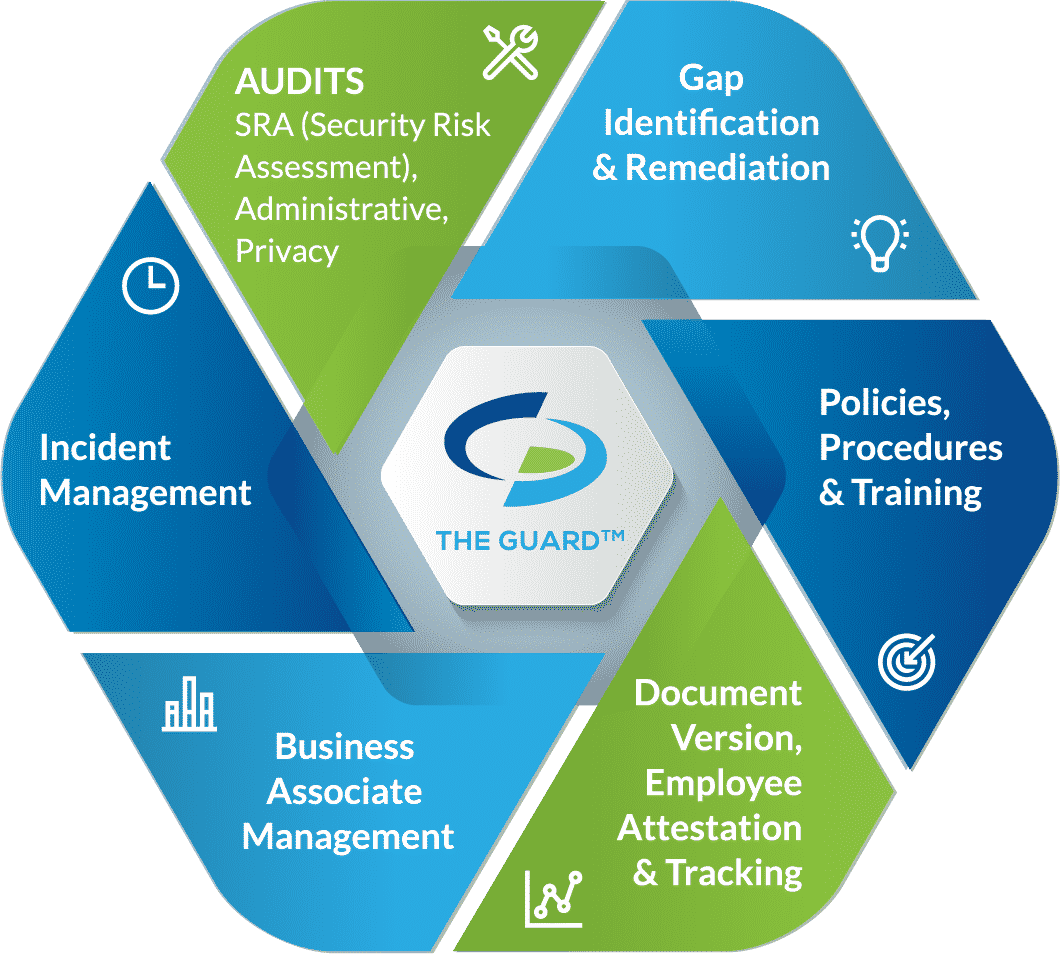HIPAA Compliance Tracking Software
Organizations working in healthcare, in any capacity, have an obligation to be HIPAA compliant. Managing HIPAA compliance can be difficult to do on your own, utilizing a HIPAA compliance policy tracking software enables HIPAA-beholden entities to implement an effective HIPAA compliance program.
What is HIPAA Compliance Tracking Software?
HIPAA compliance policy tracking software incorporates all of the seven elements of an effective compliance program recommended by the Department of Health and Human Services (HHS).
The seven elements of a compliance tracking system are as follows:
- Implementing written policies, procedures, and standards of conduct.
- Designating a compliance officer and compliance committee.
- Conducting effective training and education.
- Developing effective lines of communication.
- Conducting internal monitoring and auditing.
- Enforcing standards through well-publicized disciplinary guidelines.
- Responding promptly to detected offenses and undertaking corrective action.
The Guard HIPAA Compliance Tracking Software
Compliancy Group’s cloud-based HIPAA compliance tracking software, The Guard, is a total HIPAA compliance solution that allows covered entities (CEs), HIPAA business associates (BAs), and Managed Service Providers (MSPs) with healthcare clients, to manage their HIPAA compliance program from anywhere with an internet connection. Expert Compliance CoachesTM guide users through creating custom HIPAA compliance programs that have been tested against the letter of the law. Compliancy Group’s clients have full audit support, with a proven track record, having never failed an audit on behalf of clients.
- Self-audits
The Health Insurance Portability and Accountability Act (HIPAA) requires HIPAA covered entities to conduct six self-audits annually, five annual self-audits for HIPAA business associates. Self-audits are an included feature of the Guard. The purpose of self-audits are to assess an organization’s security and privacy practices to ensure that they adhere to HIPAA standards.
- Gap identification and remediation
Conducting self-audits allows for gaps in security and privacy practices to be identified, enabling remediation efforts to be created. Remediation plans allow for identified gaps to be closed to bring an organization’s privacy and security practices up to HIPAA standards. Once self-audits are completed in the Guard, gaps are automatically identified and remediation plans are created.
- Policies, procedures, and employee training
Policies and procedures must be created dictating the proper use and disclosure of PHI. To be HIPAA compliant, policies and procedures are required to be customized to apply directly to the organization’s business processes. The Guard provides Compliancy Group’s clients with custom policies and procedures. Policies and procedures are required to be reviewed annually, and employees must be trained to ensure that they adhere to the organization’s policies and procedures.
- Employee attestation and tracking
Employee training is conducted in the Guard, each employee is given unique login credentials enabling employee training to be tracked. Throughout the training process, employees legally attest that they have read and understood your organization’s policies and procedures. In addition, the required annual HIPAA training is conducted through the HIPAA compliance tracking software.
- Business associate management
Part of HIPAA compliance is business associate management. The Guard allows for clients to add all of their business associates to the HIPAA compliance tracking software. This enables each of your business associates to be vetted against HIPAA standards. Each business associate is sent a vendor questionnaire that assess their privacy and security practices. Completing the questionnaire identifies the business associates’ gaps so that they may be addressed with remediation plans.
In addition to vetting vendors, a requirement of HIPAA is to have signed business associate agreements (BAAs). A BAA is a legal document that dictates the safeguards that are required to be in place to secure PHI. Additionally, they limit the liability for each party as they state that each party agrees to be HIPAA compliant and each is responsible for their own compliance. Lastly, a BAA determines which party is responsible for reporting a breach should one occur.
- Incident management
Incident management is a key component of HIPAA compliance. Healthcare breaches have become more commonplace in recent years, as such HIPAA-beholden entities must be prepared in the event of a HIPAA breach. The Guard allows clients to report and track breaches. HIPAA law requires employees to have the ability to report breaches anonymously, which is a feature of the Guard.
Do you Need Assistance with HIPAA compliance?
Compliancy Group can help! Our cloud-based compliance software, the Guard™, gives you the flexibility to work on your HIPAA compliance from anywhere that has an internet connection. Our software will guide you through our implementation process enabling you to Achieve, Illustrate, and Maintain™ HIPAA compliance.




